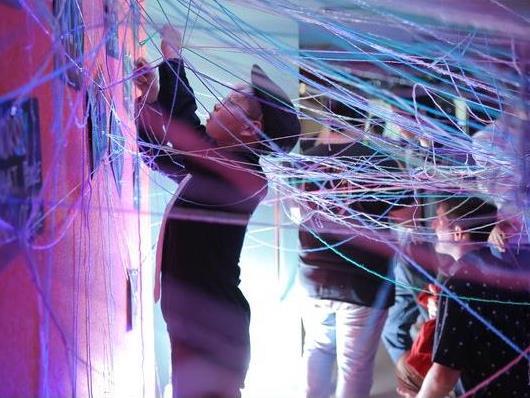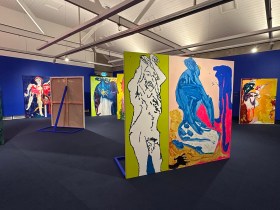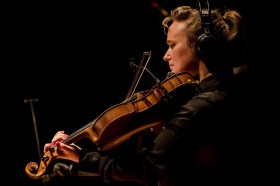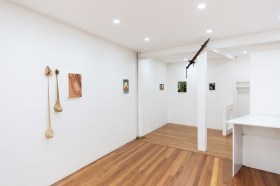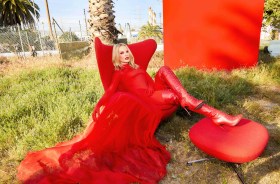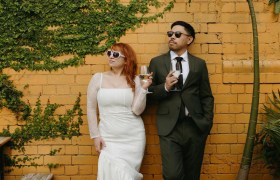Image: Genext: Kader Attia, 23 April 2017. Photograph: Maja Baska. Do you have a burning question on your mind? We invites you to post one (or more!) on its Conversation Starters Wall over the weekend of 3-4 June.
When ArtsHub approached Gill Nicol, MCA’s Director Audience Engagement, to ask why the Museum felt compelled to start ‘uncomfortable conversations’ with its audiences, she turned to American author, Ursula Le Guin.
Words are events; they do things, change things. They transform both speaker and hearer; they feed energy back and forth and amplify it.
Adopting the mantra, Ask.Talk. Listen. Repeat, Conversation Starters is a weekend event over 3-4 June that endeavours to tease out the elephant in the room through words, performances, workshops and experiences.
‘We were looking to put on something that dealt with difficulty,’ said Nicol. ‘It will be pretty intense, but I think many of our audiences are ready for that.’
The trigger for Conversation Starters is this notion that while we might have different ideas and opinions, it is common to have absolutely no idea how to start that conversation, and with whom?
Nicol said the think-tank weekend builds off the popularity of ideas festivals, which have seen an emergence in recent years, but ties that back into practicing artists and the role contemporary museums have expanding their stories.
‘We are riffing off our current exhibition by the French-Algerian artist Kader Attia, which is so issues based. So many contemporary artists are making work around our world today that is tricky. We really wanted to look at that, and extend those conversations to be more proactive – to move from just looking at art to participating in it.’
Attia was the recent recipient of the 2016 Prix Marcel Duchamp, France’s most prestigious art award, and his works explore ideas around appropriation and the tangled relationship between cultures.
This article was originally published last week with an image of a performance by the Sydney artist Cigdem Aydemir, I Will Always Love You, which referenced Attia’s work Ghost, currently on display in the MCA galleries.
In it Aydemir’s face was darkened to emulate the effect of a shadow on the form, reimagining the women kneeling in prayer Attia’s installation, and providing an alternative narrative.
The image triggered much discussion, and while the artist has decided to withdraw the performance from the MCA’s Conversation Starters program, she will join MCA Director, curators and other cultural leaders in a discussion on Saturday, 3 June at 1pm in the MCA Lecture Theatre to discuss the issues that this debate raises from different perspectives.
Nicol said: ‘When I came to work at the MCA just over a year ago a few people said to me, “It could be riskier in its public programs”. Yes, we put on amazing exhibitions but I see this conversation series as a really important part of what we do.’
The conversation will start as people enter the MCA on 3-4 June. They will be handed questions printed out on cards – questions like, “What won’t you tolerate? What is a civilised person? And, who do you trust to tell you the truth?”
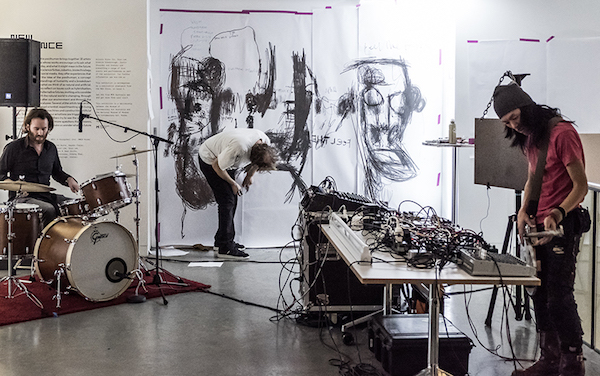
Locust Jones at MCA ARTBAR curated by Wade Marynowsky, July 2016; image courtesy and © the artist, photograph Leslie Liu
Who do you trust to tell you the truth?
With the Trump Presidency the world witnessed the emergence of “fake news”. An artist who is especially tuned into global media frequencies is Locust Jones, who attempts to find truth across the slippage of news sources.
He will be doing a 5-meter long, four-hour performative drawing as part of the Conversation Starters program.
Jones told Artshub: ‘It won’t be just some dire drawing on 4A with a HB pencil. The whole process of drawing to news feeds is like an electric pulse that comes out in the drawing.’
‘People say my work reminds them of certain events that have been eclipsed by this endless tsunami of information. That is why they switch off and throw another prawn on barbie. I will be making it more digestable and, perhaps, will jolt people out of complacency.’
How we process news is a topic that has long interested Jones. He says he doesn’t become overstimulated by news, and rather has found a level of hope amidst the darkness in this project.
‘It won’t be a literal manifestation; it will be more a primal expression. I am working with big chunky pieces of graphite, which are like mini bricks and I work with one in each hand. It has been a complete re-awakening,’ he said.
Accompanying his performance is a four-hour video that he describes as everything from ‘the 911 towers coming down to refugees on boats and people coming over euro boarders’. It is set to audio as varied as the Muslim call to prayer, church bells, news broadcasts in different languages and military aircraft.
Hope in a Dark Age: Locust Jones will take place on Sunday 4 June, 12noon–4pm, FREE.
Check out the full program for Conversation Starters weekend here.
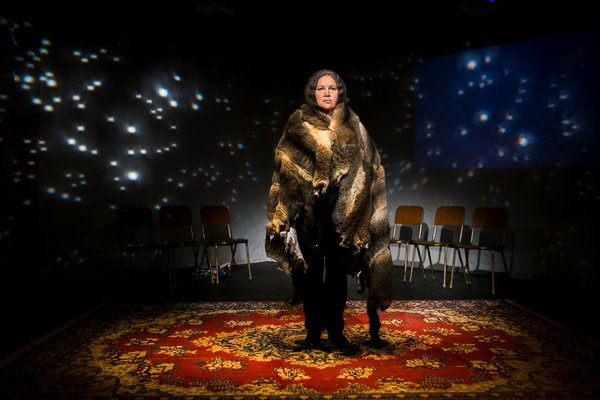
TRIBUNAL, Rhonda Dixon as Governor; photograph Alex Wisser
Who can have a voice, and who is permitted to tell the story?
Being on trial, or fighting for your cultural integrity, can be frightening and isolating. TRIBUNAL is a participatory performance project that brings together Indigenous Elders, artists, human rights activists, lawyers, outlaws and you. Recreated especially for the MCA, this will be a revised version of the original performance by PYT Fairfield at Griffin Theatre in 2016.
It puts Australia’s history on trial by telling the parallel stories of indigenous Australia and newly arrived refugees in a mock court, only to then turn judgment over to the audience.
‘It sums up everything we are trying to do,’ said Nicol. ‘The invisible wall between actors, artists and audience just disappears, and people become so immersed – and active – in these real stories.’
She continued: ‘I understand some people won’t engage, but listening is also really important, and what happens afterwards when that audience reflects back and asks more questions. I am hoping this weekend dints you a little; that it leaves a little bruise that lingers.’
The event will conclude with traditional Iraqi coffee catered by Fairfield’s Parents Cafe, a social enterprise acknowledged by the United Nations as one of the best re-settlement programs for refugees in the world.
Tribunal will be performed both Saturday, 3 June and Sunday 4 June at 6pm. Bookings are required for Tribunal.
_Hand to Mouth_2016 (LowRes).jpg)
Radha La Bia (Shahmen Suku), Hand to Mouth, 2016, performance for HAARD Collective at Secret Garden Bar, Sydney, 2016, image courtesy and © the artist, photograph: George Sandman Popov
What does it mean to be a civilised person?
From law court to court of public opinion, Conversation Starters pushers our comfort zone further proposing the question: Who gets to decide what is civilised etiquette, or not?
Dancer and performance artist Jiva Parthipan is inviting the brave and the curious to HANDFED, a mouth-watering, three-course South Asian vegetarian breakfast that will fire up your taste buds as much as your brain cells.
He believes that ‘eating with your hands is one of the most intimate relationships you will have with food’, however, Parthipan has been ‘told off’ by restaurants for doing just that.
When American TV mega-host Oprah went to India she said, “My god you people still eat with your hands”, but more recently a Michelin star restaurant in New York, Tulsi, has encouraged patrons to eat with the hands.
Where do we sit with such concerns in Australia?
Parthipan believes the Western world has become more accepting of eating food with our hands, but we just don’t recognise it. Bugers, chips, pizza, sushi – even using chopstick has gained popularity. So why not use your hands in your favourite Indian or Malaysian restaurant?
‘There is something about the public exhibition of it, which I think for all sorts of historical and cultural reasons, people find uncivilised. People find the mixing funny – the wetness – but they forget that they are already doing it.’
He continued: ‘When is the last time people used a butter knife, a knife fish, soup spoon or a splade? Increasingly we don’t use a lot of cutlery. A TV dinner is just eaten with a fork. They are things of the past, and it is absolutely a reflection of a much broader blending globally.’
Nicol added: ‘I feel museums are increasingly becoming safe for such conversations. While Jiva’s performance is about food, it really is a conversation about culture. I think people are yearning to have that different experience.’
Parthipan’s breakfast performance will be accompanied by performer Radha La Bia (Shahmen Suku) – who Parthipan describes as ‘a gender bending, hairy drag queen’ – and dancer, Rakini Devi.
HANDFED will happen on Sunday, 4 June from 9-11am. Bookings required.
Parthipan reminded: ‘This is not an event for good food month; it is an event at an art gallery, so the performance and conversation surrounding it is important.’
Nicol said that Conversation Starters is ‘an enormous opportunity to look at loads of approaches to difference – and you can choose how you want be involved.’
Are you prepared to start a conversation?
Conversation Starters
Saturday 3 – Sunday 4 June 2017
Free, some events ticketed
Museum of Contemporary Art Australia, Sydney
Conversation Starters is part of Vivid Sydney.

